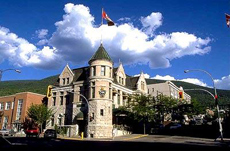
[Second of two parts: Yesterday: The World Comes to Nelson]
People are moving to Nelson, B.C. because of attractive old buildings, interesting people, a thriving arts scene, and spectacular outdoor sports opportunities. The city’s strength is the emergence of what American author Richard Florida calls the “creative class.” But despite Nelson’s liveability and entrepreneurial culture, it is not an economic powerhouse.
Smart Growth B.C., which promotes socially and environmentally responsible development, rated B.C. cities and towns in its 2004 Sprawl Report. Nelson was the second-most liveable community, based on an assessment of such things as parks, schools, culture, heritage, specialty shops, and water quality. Nelson came fourth in the urban form rating, which values compact communities over sprawling ones. But in terms of economic vitality, including the number of businesses and building permits, employment levels, and dependence on social safety nets, Nelson placed ninth in B.C.
Still, overall, Nelson placed third after Vancouver and Victoria. Smart Growth’s Shane Simpson says Nelson’s combination of arts, culture, heritage, diversity, and “creative class” entrepreneurs is unique in B.C. He says many other communities are starting to think along those lines, and are at the stage Nelson was at in the 1980s. That’s when the city began to restore its heritage streetscapes.
Many businesses, but few jobs
Mike Stolte, a local economic analyst, says that in terms of business licences, Nelson has 2.5 times the national per capita average for a small city. Sandy Gilfillan, President of the Nelson Business Association, says there are close to 400 businesses stretched along a six-block stretch of Baker St, which has no highrises. “When I’ve had to deliver newsletters or promotional material, going up and down the stairs and in the back alleys, sometimes there’ll be two or three businesses in one office.”
But there are very few jobs in Nelson, and the unemployment rate is comparable to cities and towns throughout the province. And the influx of people has driven up housing prices to a level much higher than in neighbouring Castlegar and Trail.
Those who come have often made a bundle elsewhere, and can afford not to work. Or they have brought a portable business. You need to be brave to move to Nelson without a job, hoping to find or create one once you arrive.
Those who don’t succeed at this often move away because of the lack of work. The ones who remain are usually those with an entrepreneurial temperament, resulting in a town full of imaginative self-starters who don’t mind making less than they would in a big city.
They are likely to fold in different measures of life’s rewards. “I can get from the ski hill to my canoe on the lakeshore in half an hour here, and from my house to the bike trails in minutes,” one Nelson resident told me. That outlook is typical. Nelson’s population of 10,000 supports nine sports shops, and most focus on outdoor adventure.
Graphic designer Tara Williams moved to Nelson two years ago with an established set of international clients in her laptop. “You get this very intense vibe in a very small space,” she says, “of people doing what they want to do and having the guts to do it.”
In search of the missing Nelson
Yet not everyone likes this new culture in Nelson, and they don’t think it can sustain itself. Nelson city council has trouble making ends meet because there is no major industrial tax base. There are few high-paying union jobs, and the town is geographically islotated. There are many poor people in Nelson, too, living at or below the poverty line. And the new culture of Nelson has alienated a lot of old-timers. They wonder where their city went.
There is intense debate about future economic development. One side wants to lure industry and big box stores, lobby the provincial government to ease restrictions on the mining and lumber industries, and push for new wilderness tourist resorts.
The other group wants to continue the existing trend, where new residents sacrifice high incomes but bring money, imagination, and entrepreneurship to a town where education, health care, tourism, the arts, and outdoor recreation thrive. Unlike most other cities in B.C., the latter group probably outnumbers the former.
And that group keeps swelling as more people move to Nelson. David Paetkau whose company Wildlife Genetics International analyzes genetic material for wildlife managers across the continent, has no trouble finding qualified employees in Nelson. “There are PhD’s moving to Nelson to wait tables.”
Nelson writer-broadcaster Bill Metcalfe drew on his research for the Kootenay Co-op Radio documentary Live Here Work Everywhere to write these stories for The Tyee. ![]()














Tyee Commenting Guidelines
Comments that violate guidelines risk being deleted, and violations may result in a temporary or permanent user ban. Maintain the spirit of good conversation to stay in the discussion.
*Please note The Tyee is not a forum for spreading misinformation about COVID-19, denying its existence or minimizing its risk to public health.
Do:
Do not: